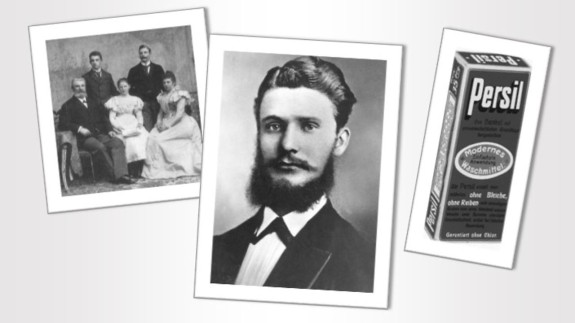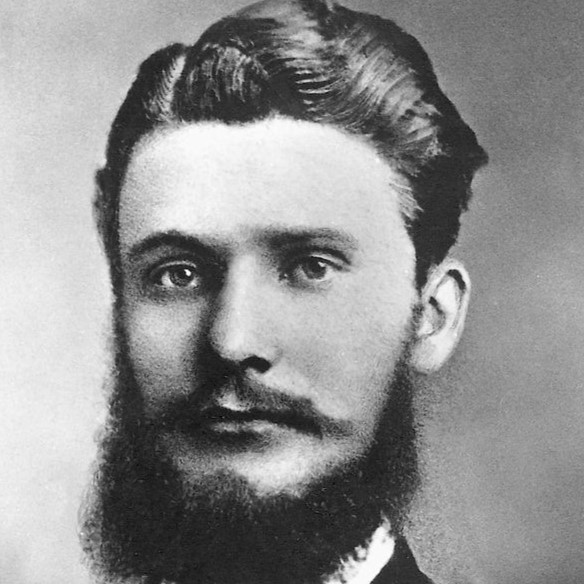He laid the foundation of a world giant company with detergent production: Karl Henkel
The history of the company began with 28-year-old trader Fritz Henkel, who was interested in science. Fritz Henkel, together with his two partners, founded Henkel & Cie in Aachen, Germany on September 26, 1876, and began marketing its first product, a silicate-based detergent. In the years that followed, this entrepreneurial family and its thousands of employees transformed Henkel into a global company.

Fritz Henkel, the founder of the Germany-based company Henkel, was interested in the field of chemistry from an early age. While working as an apprentice in a paint and varnish factory in Elberfeld, he both improved himself in the field of chemical compounds and learned the tricks of the trade. Henkel's Bleich-Soda (Henkel's Bleaching Soda), which he sold through the Henkel & Cie company he founded in 1876, inspired the Persil brand he created in 1907. Today, Henkel produces detergents, paints, perfumes, etc. is a global player incorporating many brands in its products. With brands such as Bref, Dixi, Pattex, Perwoll, Pril, Pritt, Tursil, Vernel in addition to Persil, Henkel meets the cleaning, hygiene and many other needs of millions of users every day.
Who is Fritz Henkel? (1848-1930)
Friedrich Karl Henkel, known as Fritz Henkel, was born on March 20, 1848, in Vöhl, Germany, as the fifth child of the Henkel family. His father, Johann Jost Henkel, who was a primary school teacher, was very interested in little Fritz's lessons and wanted him to get a good education. Fritz's interest in science, especially chemistry, emerged at an early age. During his student years, he was most interested in chemistry. However, educational opportunities in the city of Vöhl were limited. Elberfeld, one of the most important industrial centers of the period, was home to young people who were interested in science from many settlements in Germany. One of the most important features of Elberfeld was the formation of training opportunities and production activities together. That's why Fritz Henkel went to Elberfeld in 1865 to improve himself in chemistry. He received an apprenticeship in the paint and varnish factory of the Gessert brothers.
After an apprenticeship with the Gessert brothers, Fritz Henkel was hired as a primary employee. Thanks to his intense interest in the field of chemistry, as well as his communication and organizational skills, he managed to become the manager of the factory in a short time. He married Elisabeth von den Steinen in Elberfeld in 1873. Although his financial situation was not bad, it was not enough to meet the needs of his family. Therefore, Fritz Henkel left the factory where he worked and became a partner in a chemical and paint wholesaler in Aachen. Unlike Elberfeld, Aachen had stronger opportunities in the field of trade due to its geographical location. In Aachen, located on the border of Belgium and the Netherlands, it was possible to earn higher income thanks to the sales of chemicals and dyes. Having maintained its partnership in the wholesaler for 2 years, Fritz Henkel wanted to introduce the washing powder obtained from a mixture of potassium silicate and soda to the market. But he did not have enough resources. Thereupon, he took two partners with him and founded Henkel & Cie in 1876.
The Henkel & Cie company was founded in a house in Aachen and had only 3 employees. Fritz Henkel's partners Otto Dicker and Otto Scheffen left the company shortly after. But thanks to the Rheinische Wasserglasfabrik, run by his partners, Fritz Henkel had solved the problem of supplying the raw materials for the production of laundry detergent. Later, the company moved its headquarters to Duesseldorf, where he rented an empty soap factory. He used Henkel's Bleich-Soda (Henkel's Bleaching Soda) brand name for its products and started its advertising activities. Compared to Aachen, Duesseldorf had more opportunities for advertising and marketing. Advertisements placed in newspapers and magazines by Fritz Henkel enabled Henkel's Bleich-Soda products to reach a wide user base in a short time.
In the 1880s, Fritz Henkel made significant gains in the detergent market. In addition to detergents, Fritz Henkel, which also entered into the chemical trade, tea, pharmaceutical and perfumery businesses, attached great importance to packaging in order for its products to stand out in the market. In other words, he was evaluating the packaging within the advertising activities. In addition to the products, it enabled the Henkel name to be recognized in the market and to become a reliable name. The interest in the Henkel name had a positive impact on the sales of the products and gave the company a high turnover success. Thanks to the capital obtained, the 55 thousand square meter factory established in Holthausen enabled Henkel to meet the supply needs necessary for even faster growth. The main field of activity of the factory, which was completed in 1900 and consisted of 4 building complexes, was cleaning and hygiene. While Henkel's growth continued thanks to this factory, the economic and social rights granted to the workers at the factory were quite advanced compared to the conditions of the time.
Persil: “Self-washing detergent!”
In 1907, Fritz Henkel placed an interesting advertisement in the newspapers. The advertisement promoted a new washing powder that could effortlessly turn clothes white with a one-shot boiling. Fritz Henkel had created a huge advertising budget of 1 million marks for the Persil brand, which was created from the first three letters of the perborate and silicate materials used in its composition. The slogan “self-washing detergent” for Persil suddenly drew attention to Fritz Henkel in the detergent market. In addition to the full-page advertisements placed in newspapers and magazines, teams in white clothes roaming the crowded streets of Duesseldorf ensured Persil's success in promoting its products. As the sale of 660 tons of Persil, which was produced during the year, was completed, some difficulties began to arise in meeting new orders. Business contacts were developed to procure the sodium perborate required for the production of Persil.
Within 6 years, Persil sales increased 50 times and reached the level of 30 million marks. During the World War I, Persil became one of the most sought-after detergent brands in almost all European countries. During the war years, Henkel continued to grow. And it became one of the largest detergent manufacturers in Europe. Persil products have indeed made hand washing effortless. At the same time, it prevented clothes from getting worn out. In addition to homes, the use of Persil in military units has gradually increased. In this period, the most preferred laundry detergent for cleaning military uniforms was Persil. The company's first representative office outside Duesseldorf was opened in Switzerland. Then the name Fritz Henkel started to become a school in London and many other countries. In 1926, Fritz Henkel, after his death, gave the company's capital until it passed to his children. He died in Dusseldorf in 1930.
Following Fritz Henkel, the company continued to grow in the detergent, paint and perfume market. Henkel, which also pioneers new technologies in its sector, has become a global power that sets standards in cleaning, hygiene, personal care and many more, thanks to the methods it has developed. Today, Henkel has brands operating in areas such as organic chemistry, cosmetics, pharmacological chemistry and serving in many product groups such as deodorants, creams, perfumes, adhesives and glues.

